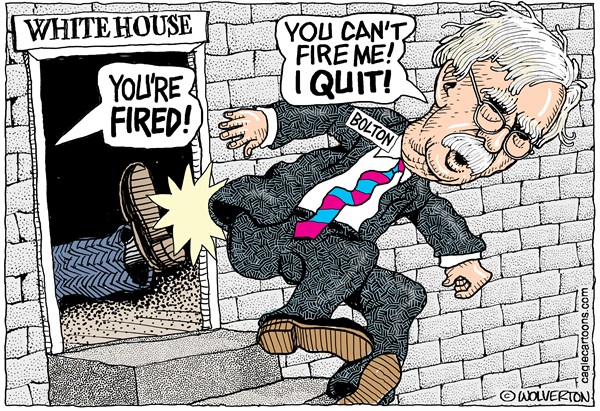
John Bolton’s firing has sent a huge sigh of relief through key European capitals, especially those that want to prevent war with Iran because he was seen as a war-obsessed Svengali mesmerizing President Donald Trump.
An early sign of international relief was the 2.2% drop in oil prices indicating optimism that the pressure on Iran might abate a little.
French President Emmanuel Macron and other European leaders are determined to stop Iran from acquiring a usable nuclear weapon, but they do not support regime change in Tehran as does Bolton. They also do not want to become part of Trump’s and Treasury Secretary Mnuchin’s obsession with bringing Iran’s leaders to the negotiating table by tormenting its people through economic pain and deprivation.
With Bolton gone, Macron and others are hoping that Trump’s wiser angels will prevail. The overall opinion in European capitals after more than two years of studying Trump’s negotiating style is that he likes to make strident threats and loudly rattle cages but feels no shame in changing tack.
America’s national security team consists of the national security adviser, the secretary of defense, the secretary of state, the secretary of Treasury, the chief of staff and many others. It might now make more balanced decisions, free from Bolton’s paranoid influence and his expertise at bureaucratic infighting,
Bolton’s views are not far from those of Trump but his belligerence is far greater. Trump wants to get American troops out of the world’s trouble spots and let others die in their own internecine conflicts. Bolton wants those trouble spots to bow to American military power and acquiesce to its demands or face its wrath.
These types of perceptions might seem caricatural to some but for many Europeans Trump is the frying pan and Bolton is the fire. To their relief, the fire is now switched off so Trump’s foreign policies may cause fewer burns to others. In any case, that is the hope.
The main reason for relief in the offices of leaders in France, Germany and other EU members is the hope that Trump may now feel freer to act more prudently in relation to Iran. Their nightmare is a sudden military attack on Iranian radar or other facilities by the US and Britain as Bolton sought. Or worse, overt manipulation influenced by Israel and Saudi Arabia to destabilize and overthrow the Shia theocratic regime in Iran.
Both an attack, however limited, and political chaos in Iran are nightmares because of not only the likely horrendous bloodshed among civilians but also the millions of internally displaced people and the deluge of others trying to escape to European countries.
Bolton is also much disliked because of his arrogance in treating NATO allies as freeloaders and encouraging illiberal anti-immigrant and nationalist behavior in Poland, Hungary and elsewhere, thus giving license to undemocratic acts hostile to the European Union’s liberal founding principles.
The United Nations and international agencies will also be glad to see the back of a person so hostile to their founding ethos of promoting multilateral cooperation among governments and so eager to roll back US support for the international system it created after World War II.
The big mystery remains of exactly why Trump fired Bolton. And to the dismay of more decorous European leaders, the indignities of the White House’s rancorous infighting are already ungraciously tintinnabulating around the world. The President and his former National Security Advisor are each implying that the other is a liar in their clash over whether Bolton was fired or he resigned before he could be fired.
Bolton has threatened to “have his say” in coming days and started working his media contacts within minutes of Trump’s tweet that announced, “his services are no longer needed at the White House”. Such street-fighter behavior at the top echelons of power is unthinkable in most European capitals.
Mnuchin may still continue his maximum pressure campaign to impoverish Iran by blocking off access to US dollars and punishing any company or individual doing business with Iranian enterprises, particularly those linked with its armed forces.
But there is an expectation, following Macron’s initiative at the G7 summit earlier this month, that some kind of letter of credit will be made available to Tehran to prevent its economy from collapsing entirely.
For a while it looked as if a $15 billion line of credit might be opened with Trump’s acquiescence but Tehran seems to have rejected it as far too little. However, the line of credit idea does provide a more or less legal way of reducing the pain inflicted on Iran’s people without violating US laws and sanctions.
Nobody really knows what hidden capabilities Iran has to build nuclear weapons or whether it already has some out of sight. If Mnuchin’s maximum pressure starts to truly rattle Iran, it could suddenly carry out a nuclear weapons test to create deterrence against war given that it already has the necessary missiles. This possibility cannot be ruled out, astonishing as it might be.
What France and Germany, together with several other Europeans, want is a relaxation of the economic torture of Iranians to prevent a social explosion that destabilizes the regime and results in spasms of failed governance, internal violence or civil war for years to come.
Bolton was seen as the chief proponent of this kind of apocalypse simply because he wanted to underscore American supremacy. The hope now is that Trump will relent a little to provide some breathing space for France and others to dissuade Tehran from further violating the 2015 nuclear pact, from which Trump has withdrawn.
















